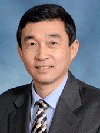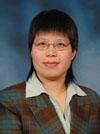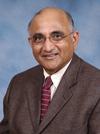Advisors |
|
Director
Dr. Heng Wei
Professor
E-mail : heng.wei@uc.edu
Office : 792 Rhodes Hall
Phone : (513)-556-3781
Fax : (513)-556-2599 |
 |
Areas of Interest
Intelligent transportation systems (ITS), computing and communication technologies in transportation infrastructure systems, geographic information system (GIS) application, vehicle routing modeling and optimization, microscopic traffic simulation modeling, vehicle trajectory data extraction, ITS security and survival systems engineering, transportation systems performance, advanced technologies in highway safety, traffic flow theory and characteristics, travel demand forecasting, adaptive signal control, artificial intelligent techniques in transportation, and Transport Telematics. |
|
Honorary Advisor
John C. Niehaus, P.E.
Adjunct Professor
E-mail : John.Niehaus@uc.edu
Office : 788 Rhodes Hall
Phone : (513)-556-3698
Fax : (513)-556-5299 |
 |
Areas of Interest
Niehaus' primary areas of interest are traffic and transportation engineering and planning. Focus within these areas is generally on the applied or practical aspects, based on 40+ years of experience in the profession in both the public and private sectors. Courses emphasize design and studies and include real-world projects in conjunction with public agencies. Oral and written communications are also stressed and included in the projects. Also lead professor in the senior Integrated Design Sequence capstone course which involves a team of industry mentors working with the class. |
|
Collaborative Advisor
Dr. Mingming Lu
Associate Professor
E-mail : Mingming.Lu@uc.edu
Office : 797 Rhodes Hall
Phone : (513)-556-0996
Fax : (513)-556-2599 |
 |
Areas of Interest
Submicron particle and PAH formation mechanisms from combustion processes including diesel, biodiesel, coal, and waste derived fuel, etc.; the compositional characterization of aerosols and gaseous pollutants from industrial, transportation and agricultural sources; development of novel carbon nanomaterials to remove highly toxic bioaccumulative air pollutants; and development of particulate control technologies. |
|
Collaborative Advisor
Dr. Tim Keener
Professor, Special Assistant for Industry Outreach
Office : 701B Engineering Research Center
E-mail : Tim.keener@uc.edu
Phone : (513)-556-3676
Fax : (513)-556-2599 |
 |
Areas of Interest
Tim Keener is a Professor and member of the faculty of the School of Energy, Environmental, Biological and Medical Engineering of the college of Engineering and Applied Science of the University of Cincinnati. His research interests are in the areas of air pollution control and air quality management. He has extensively researched the prevention of formation, and control of pollutants from fossil-fueled fired power plants and other industrial sources. He has contributed to the development of methods for the measurement and control of air pollutants, including sulfur dioxide, nitric oxides, VOCs, CO2 and mercury. In addition, he has researched the evolution of pollutants from the combustion of fossil fuels, the formation and control of odors, and developed innovative methods of measuring air pollution emissions from industrial sources. He is currently involved in the development of cost effective methods for separating CO2 from flue gases, and the evaluation of algae as a source of biodiesel. |
|
Collaborative Advisor
Dr. Anant R. Kukreti
Professor, Associate Dean for Engineering Education
E-mail : anant.kukreti@uc.edu
Phone : (513)-556-4105
Fax : (513)-556-2599 |
 |
Areas of Interest
Dr. Kukreti worked in a faculty position for 22 years at the University of Oklahoma; serving as Acting Director of the School of CEES from 1996-1999, before moving to University of Cincinnati in August, 2000. Dr. Kukreti teaches undergraduate and graduate courses in structural engineering, and his research interests include Finite element analysis and experimental studies of linear and nonlinear static and dynamic structural systems, behavior and design of steel connections, and seismic analysis and design. Sub-structuring analysis procedures for large complex systems. Small-scale modeling and testing. Constitutive modeling and fracture. Modeling of flow through porous media. |
|
|
|